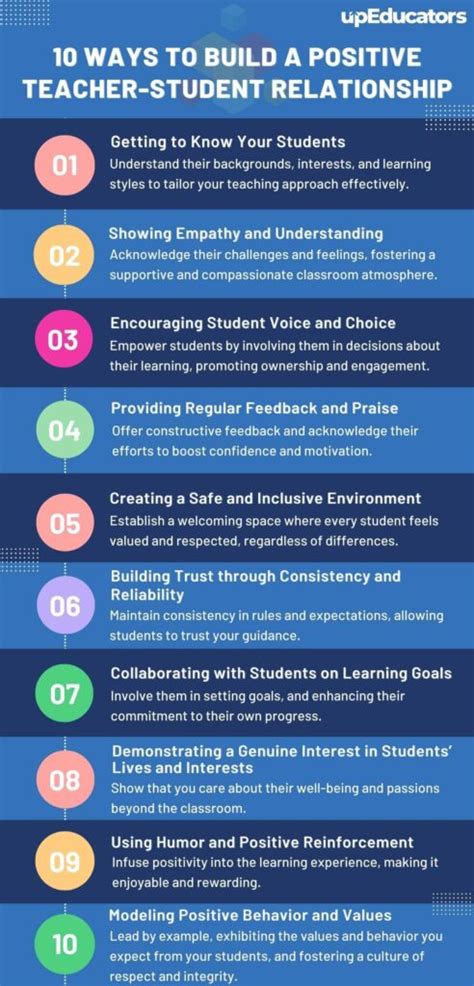How to Build Strong Relationships with Your Teachers

Building strong relationships with your teachers can make a significant difference in your academic experience. A positive connection with educators can not only help you perform better in class but also contribute to your personal growth, well-being, and overall school experience. Teachers are often more than just instructors; they can be mentors, guides, and sources of inspiration. Here’s how to foster meaningful relationships with your teachers:
Be Respectful and Polite
The foundation of any good relationship is respect. In the classroom, show respect for your teacher's time, authority, and expertise. Address them courteously, listen attentively when they speak, and follow classroom rules. Demonstrating respect doesn’t mean you have to agree with everything they say, but it does mean engaging in a way that acknowledges their role and contributions.
Small acts of politeness like greeting your teacher with a smile, saying "please" and "thank you," and waiting your turn to speak can go a long way in building rapport.
Show Genuine Interest in the Subject
One of the easiest ways to connect with a teacher is to show enthusiasm for the subject they teach. Ask thoughtful questions, engage in discussions, and demonstrate curiosity. Teachers enjoy working with students who are eager to learn and who actively participate in class activities. Your interest in the subject will not only deepen your understanding but also help create a bond with your teacher, as they will see that you value their expertise.
Communicate Effectively
Communication is key to any relationship, and this is true for your relationship with your teachers as well. Be clear when discussing your concerns, questions, or needs. If you're struggling with a concept, don't hesitate to ask for clarification. Teachers appreciate students who take initiative in their learning by reaching out for help when necessary. Additionally, keep teachers informed about any issues that might affect your performance, such as personal challenges or scheduling conflicts.
It’s also important to communicate positively. Compliment their teaching methods when appropriate or thank them for their support. Teachers, like anyone else, appreciate recognition for their hard work.
Take Responsibility for Your Learning
Teachers respect students who take ownership of their education. This means being accountable for your assignments, staying organized, and keeping track of deadlines. If you make a mistake or fall behind in your work, own up to it and ask how you can improve. Teachers will be more inclined to support students who are proactive and show a commitment to growth.
When teachers see that you are dedicated to your learning, they are more likely to invest time and energy in helping you succeed. This can lead to a deeper, more supportive relationship between you and your teacher.
Be Open to Feedback
Part of building a strong relationship with your teacher involves being open to constructive criticism. Teachers want to see you succeed, and feedback is an essential tool for growth. Instead of becoming defensive when receiving feedback, view it as an opportunity to improve. Ask questions if you don't understand the feedback and seek guidance on how to make improvements.
A teacher will appreciate a student who is receptive to feedback and demonstrates a willingness to learn from their mistakes.
Be Consistent and Reliable
Being consistent in your efforts and showing up regularly for class are important ways to build trust with your teachers. If you consistently complete your assignments on time, attend class regularly, and participate actively, your teacher will know they can rely on you. Consistency shows that you are serious about your education, and teachers are more likely to offer additional support to students who demonstrate a strong work ethic.
Show Appreciation
Teachers often work long hours and put in significant effort to help their students succeed. A simple thank-you or a note of appreciation can go a long way in strengthening your relationship. Recognizing their hard work and expressing gratitude makes them feel valued and respected.
Consider thanking your teacher after a particularly helpful lesson or for the extra time they spent helping you. It’s a small gesture that can have a big impact.
Get Involved in Class Activities
Another way to build a strong relationship with your teacher is by being involved outside of just the academic requirements. Volunteer to help with classroom tasks, participate in extracurricular activities related to the subject, or offer to assist with projects. Teachers appreciate students who are enthusiastic and eager to contribute beyond just the minimum expectations. This involvement not only strengthens your relationship with your teacher but also enriches your learning experience.
Be Honest and Transparent
Honesty is crucial in any relationship, including the one you share with your teachers. If you're struggling with something—whether it's a personal issue, a learning difficulty, or a misunderstanding—be open about it. Teachers appreciate when students are honest about challenges they’re facing, as it allows them to offer the right support or accommodations.
When you communicate openly, it shows maturity and trust, which helps build a stronger, more respectful relationship.
Demonstrate Kindness and Empathy
Teachers are human, too. Just like students, they have their good days and bad days. Showing empathy when you notice that your teacher might be under stress or dealing with challenges can deepen your connection. A little kindness goes a long way—offering a friendly word or showing consideration when your teacher is busy can create a positive, supportive classroom atmosphere.